Our website is supported by our users. We sometimes earn money when you click an affiliate link and make a purchase. This is at no extra cost to you and helps us to create quality content. Thank you so very much for your support.
The Doberdoodle is a hybrid breed, that is a mix of Dobermans and Poodles, that is known to respond very well to training and provides protection for families.
The Doberdoodle is not a registered dog breed with the American Kennel Club. Many refer to it simple as a Doberman poodle mix.
When trying to trace the exact origin of the Doberdoodle, many come up short. Although there are no official records of this combination of breeds, they did begin to gain popularity in the 1980’s.
A Doberdoodle puppy is much like other puppies, it needs proper nutrition, healthy boundaries, house training, and obedience training. Many people search out a doberdoodle breeder if they are looking for a security dog that also makes an excellent family pet.
History of the Two Parent Breeds of the Doberdoodle
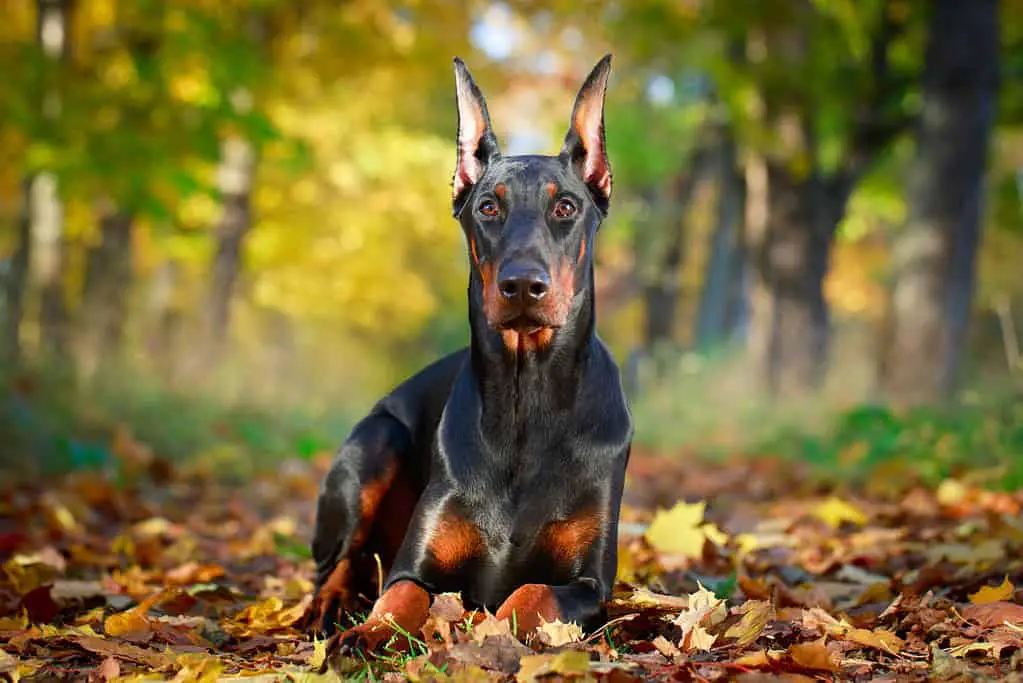
A Doberman Pinscher is originally native to Germany. They can be described as an active dog, tenacious with a stubborn streak and a loving dog protective of its family unit.
Many associate the Doberman with military use and police dogs. Doberman owners found they make excellent guard dogs.
The cornerstone of high-class Doberman breeding in America was laid by Annagret II v Thueringen and female Claudius v Thueringen, two of the first quality Dobermans imported to the United States in 1907.
The American Kennel Club recognized the Doberman Pincher as an official breed in 1908.
The Doberman is a highly protective dog and dedicated to its family making them great family dogs. They are loyal companions that will come across indifferent to strangers.
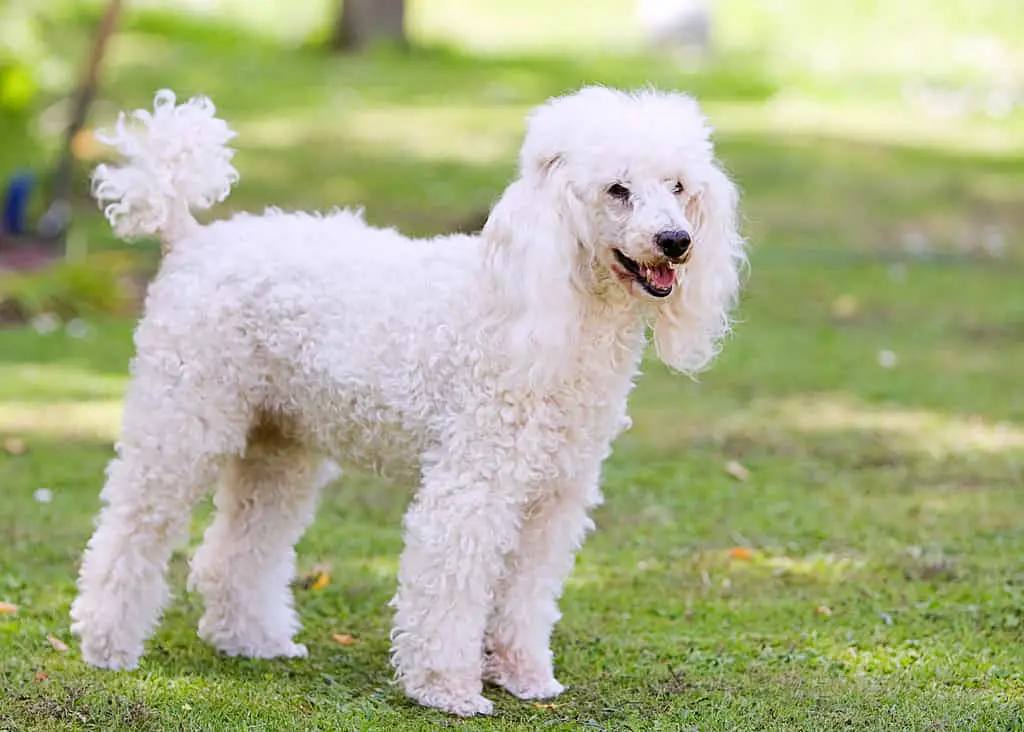
Another dog breed native to Germany is the Standard Poodle. They have long history with the American Kennel Club and were accepted as an official breed in 1887. People were drawn to their intelligence and beauty.
They also make wonderful water dog that were often trained as duck and bird hunting dogs.
Physical Characteristics of the Doberdoodle
Now the Doberdoodle breed is considered a unique designer breed. Dog owners are attracted to its short coat and floppy ears.
Dog owners could get a Doberdoodle puppy that favors the appearance or personality of either parent. Doberman genes allow for the coat to be smooth medium-length coat. While the standard Poodle genes will pass down a curly and long coat.
The coat variations of the Doberman Poodle mix can be black, tan, red, grey, or a combination of those colors. Each dog is different, however most have either a tan, black or brown muzzle.
One feature of both the Doberman parent and Poodle parent is a long neck. The Doberdoodle’s, considered a large dog breed, physical characteristics include a long body and long legs. It usually stands approximately 24-28” high and weighs between 65 – 90 pounds.
The Doberdoodle could have a deep chest characteristic of the Poodle or the strong muscular build favoring the Doberman. The head features almond shaped eyes that can be brown or hazel with droopy ears.
As with all hybrid breeds, your Doberdoodle’s appearance will vary between Coat length can vary from short hair to medium depending on the genes. The parent breeds also pass down whether or not the Doberdoodle will have the smooth coat of the Doberman or a curly coat of the Poodle.
Is the Doberdoodle hypoallergic? If you are highly allergic to dog hair and dander, this might not be the best breed for you. Although the Doberman Pincher is low shedding as the hair loss is minimal, it still daily loses hair and dander. The curly coat of the Poodle still requires regular grooming even though it sheds very little hair on a daily basis.
This Doberman Poodle mix can be best described as a medium to large dog that has a long muzzle and floppy ears. The coat can be curly or medium long depending on the dominant genes. The brown eyes and bushy eyebrows give this dog a playful appearance.
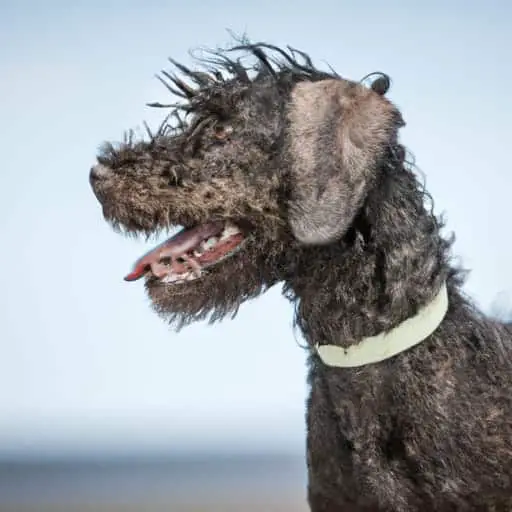
Temperament & Training of the Doberdoodle
As with many dog breed mixes, you could get the best traits from either breed or less favorable traits. Dog owners have been attracted to this mixed breed as it is known to be courageous and confident.
The mixed breed dog has a calm temperament making it suitable for people that like to be active with their dog. Dog owners love that the Doberdoodle can be affectionate and a wonderful loyal companion. Another plus is the Doberman genes make this mixed breed a good guard dog.
One of the lesser desirable traits is separation anxiety. It is not uncommon for doodles to experience separation anxiety when they see their owners prepare to leave the house. If left unattended for long periods of time, the puppy can develop bad habits and begin to chew on furniture and other household items.
As with any dog, training is an essential part of raising a well-behaved and obedient Doberdoodle. Here are some important considerations for training a Doberdoodle.
Firstly, socialization is crucial for Doberdoodles. They need to learn how to interact appropriately with other dogs and people to avoid aggression or fear-based behavior. Early socialization with positive reinforcement techniques is highly recommended to ensure that the Doberdoodle develops into a confident and friendly dog.
Secondly, obedience training is necessary to teach basic commands such as “sit,” “stay,” “come,” and “heel.” Positive reinforcement methods such as treats, praise, and playtime should be used to reinforce good behavior.
Thirdly, leash training is essential to ensure that the Doberdoodle can be taken for walks without pulling or running away. It is also important to train them to come when called, particularly in case of emergency situations.
Fourthly, crate training can be helpful in housebreaking and providing a safe and comfortable space for the Doberdoodle to retreat to when necessary.
Lastly, advanced training can be beneficial for Doberdoodles that are used for activities such as therapy work, agility, or obedience competitions. Specialized training can help to develop skills specific to the activity and strengthen the bond between owner and dog.
Doberdoodle Health Conditions
Before bringing a dog into your life, learn about any breed specific health problems. Every dog breed is genetically predisposed to certain health issues. The Doberdoodle, a Doberman Pinscher Poodle mix, is no exception.
Health conditions that dog owners need to be aware of are hypothyroidism, gastric dilatation volvulus, cardiomyopathy, wobbler’s syndrome and hip dysplasia.
The Doberman Pinscher is generally a healthy breed, but like all dogs, they can be prone to certain health conditions. Some common health issues that can affect Doberman Pinschers include:
- Dilated Cardiomyopathy (DCM)
- This is a heart condition that affects the ability of the heart muscle to pump blood that leads to eventual heart failure. Doberman Pinschers are particularly susceptible to this condition. Dogs can exhibit symptoms such as excessive panting, lethargy, and improper breathing.
- Hip Dysplasia
- This is a condition where the hip joint doesn’t develop properly, which can lead to arthritis and lameness.
- Von Willebrand’s Disease: This is a bleeding disorder that affects the blood’s ability to clot properly.
- Hypothyroidism
- This is a condition where the thyroid gland doesn’t produce enough hormones, which can lead to weight gain, lethargy, and other symptoms.
- Wobbler Syndrome
- Wobblers syndrome is a disease of the spinal cord, specifically the cervical spine which affects the dog’s neck movement and gait. Dog owners might notice stiffness in the neck, uncoordinated gait, and weakness in limbs.
As with all dog breeds, Poodles are susceptible to various health conditions, some of which are an inherited condition and some of which are acquired. Here are some common health conditions that Poodles may be prone to:
Hip Dysplasia
As mentioned, this is a genetic condition that affects the hip bones and can cause pain, limping, and arthritis. It is more common in Standard Poodles than in Miniature or Toy Poodles.
Eye Problems
Poodles are prone to several eye problems, including cataracts, progressive retinal atrophy, and glaucoma.
Ear Infections
Poodles have long, floppy ears that can trap moisture and lead to ear infections if not cleaned regularly.
Skin Issues
Poodles can be prone to skin allergies and skin infections, especially if they have a thick or curly coat that is not properly groomed.
Gastric Dilatation Volvulus as known as Bloat
This is a life-threatening condition in which the stomach fills with gas and twists, cutting off blood flow to the organs. Poodles are at increased risk for bloat due to their deep chest. Symptoms could include vomiting, visible pain, inability to burp, and restlessness. This can be life threatening if not noticed right away.
Epilepsy
Poodles can be prone to epilepsy, a neurological disorder that causes seizures.
Addison’s Disease
This is a hormonal disorder in which the adrenal glands do not produce enough hormones. Poodles are at increased risk for Addison’s disease.
It’s important to note that not all Doberdoodles will develop these health conditions, and many can live long, healthy lives with proper care and attention from their owners.
Training Your Doberdoodle
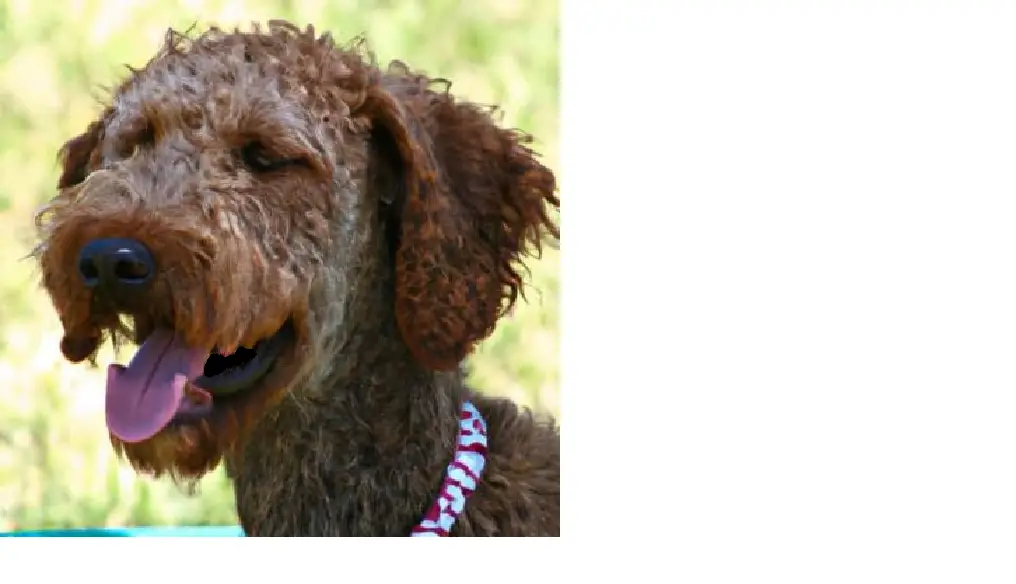
When people decide to add a dog into their life, they should expect that it will need some form of training. Dogs need to know boundaries both in the home and outside the home. Participating in a puppy obedience class will allow your new Doberdoodle to begin learning to become a well-mannered adult dog.
Doberdoodles exercise requirements are versatile as they enjoy changing things up with walks in the neighborhood, swimming, hiking, and running. As the hybrid mix of two very intelligent breeds, they like brain games and challenging dog puzzles. These dogs can be trained to participate in canine scent sports which appeals to their natural instincts.
Keep in mind the Poodle parent breed was once trained to be a bird and gun dog. They respond well to obedience training, and some might enjoy retrieving.
Grooming Your Doberdoodle
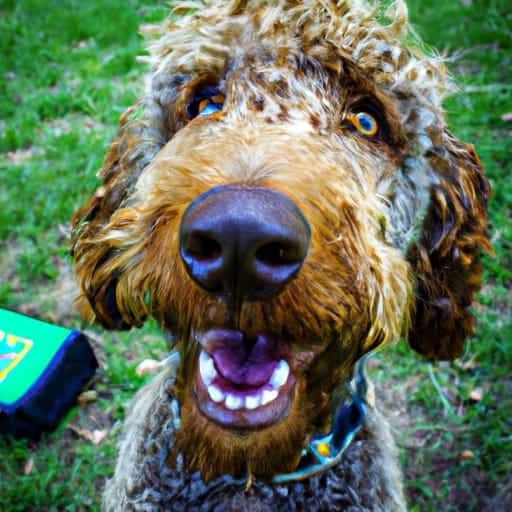
Dog owners usually like to bath their Doberdoodle once a month to keep the skin and coat healthy. Professional dog groomers can advise on additional grooming recommendations.
- Brushing: Doberdoodles have a thick, wavy coat that needs to be brushed from daily to at least once a week to prevent matting and tangling. You may also need to brush them more frequently during shedding season. Two tools that work well are a wire slicker brush and a metal comb. Both parent breeds have a single coat which allows for minimal shedding.
- Bathing: Doberdoodles do not need to be bathed frequently, but they should be bathed every few months or when they get particularly dirty or smelly. Be sure to use a dog-specific shampoo and conditioner for curly hair.
- Nail grinding and trimming nails: Doberdoodles’ nails should be ground or trimmed every few weeks to prevent them from getting too long and causing discomfort or difficulty walking. For more information on grinding check out our article How To Grind A Dog’s Nails Safely.
- Teeth brushing: All dogs are prone to dental issues if their teeth are not properly maintained. Doberdoodles are no different, so it’s important to brush their teeth regularly to prevent tartar buildup and gum disease. As a large dog, there is more room to work so they can tolerate a larger brush. And don’t forget the toothpaste!
- Ear cleaning: Doberdoodles have floppy ears that can trap moisture and debris, leading to ear infections. Their ears should be cleaned regularly with a dog-specific ear cleaner and dried thoroughly after bathing or swimming. The best cleaner is from your veterinarian. However, if you need a quick or less expensive solution, we like this one.
- Hair trimming: Doberdoodles may need occasional hair trimming around their face, feet, and sanitary areas. You can either do this yourself with grooming scissors or take them to a professional groomer.
- Eye cleaning: Doberdoodles can be prone to eye discharge and tear staining, so it’s important to clean their eyes regularly with a damp cloth or eye wipes.
Remember, grooming needs may vary depending on the individual dog and their coat type, so it’s always a good idea to consult with a veterinarian or professional groomer for personalized advice.
Owning a Doberdoodle
No one is certain if the original purpose of breeding the Doberman Pincher and Standard Poodle was to make a excellent family pets that has protective instincts or if it was done unintentionally.
Owning a Doberdoodle can be an excellent choice for those seeking a loyal and affectionate companion with a unique look. However, it is essential to consider the all aspects of ownership before deciding to bring one home.
The cost of purchasing a Doberdoodle can vary depending on the breeder and location. Generally, breeders who specialize in Doberdoodles tend to charge more than those who breed purebred Dobermans or Poodles. The average cost of a Doberdoodle can range from $1500 to $3500.
Maintenance costs for a Doberdoodle can also be high. Due to their unique coat, they require regular grooming to maintain its quality and prevent matting. Grooming costs can vary, depending on the type of groomer and the frequency of grooming. Owners should expect to spend around $50-$100 per grooming session. Additionally, Doberdoodles require regular exercise and proper nutrition, which can add to the cost of ownership.
Special training for a Doberdoodle is necessary, as they are a cross between two highly intelligent breeds. Early socialization and training can help prevent behavior problems down the road. Owners should expect to spend around $100-$200 per training session.
Medical costs for a Doberdoodle can also be high. They are prone to certain health issues, such as hip dysplasia, von Willebrand’s disease, Wobbler disease and cardiomyopathy. Regular check-ups, vaccinations, and preventative care can help keep medical costs down. However, owners should still expect to spend an average of $500-$1000 per year on medical expenses.
Finding a reputable Doberdoodle breeder can also be a challenge. It is essential to do thorough research and ask for recommendations from trusted sources. Owners should also be prepared to travel to find a breeder that meets their needs.
Drawbacks of owning a Doberdoodle can include their personality traits, a high energy level, which can make them unsuitable for apartment living. They can also be prone to separation anxiety, which can lead to destructive behavior. Doberdoodles require an experienced owner who is willing to devote time and attention to their training and exercise needs.
Additionally, they are intelligent and trainable using positive reinforcement, making them suitable for various tasks, such as therapy or service dogs.
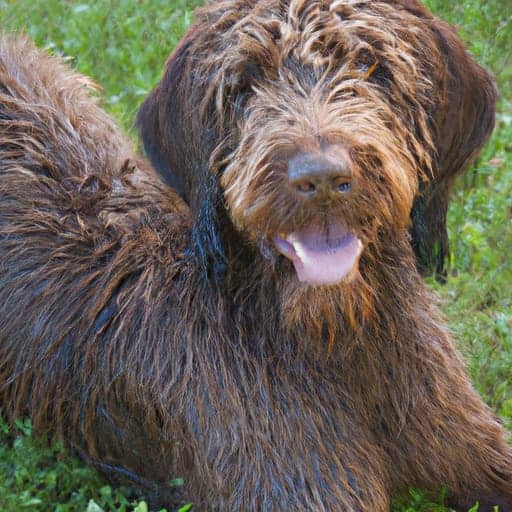
FAQs About the Doberdoodle
Are Doberdoodles hypoallergenic?
This is a tough question to answer. The short answer is no, because there is no dog that is completely allergen free.
When people are allergic to dogs, it is mostly because of the dander, or otherwise known as shedded skin cells. Every dog, even those that are fur free, will shed skin cells. That said, there are some breeds that shed dander less than others and those are considered to be hypallergenic.
Furthermore, the Doberman Pinscher is not considered to be hypoallergenic. Conversely, the Poodle IS considered to be hypoallergenic.
Therefore, whether your dog is going to hypoallergenic depends on which parent breed has contributed the most DNA to your dog.
If you are considering getting a Doberdoodle puppy, and there are people in your home with known allergies to dogs, you may consider a different breed. Also, before you get any dog, you may test to see if you or your family members are allergic to dogs.
Rehoming a dog due to allergies is stressful to the dogs and also to the family members who may have fallen in love with the dog.
How much does it cost to buy a Doberdoodle?
You can find Doberdoodle puppies for as low as $375, however, you may not get a healthy dog.
If you buy from a reputable breeder the cost can range from $1000-$1800.
The Bottom Line on the Doberdoodle
All dogs have unique personalities. This mixed breed dog is loyal and most enjoy interacting with their family members. Early socialization is very important for this mixed breed; positively expose your dog to all kinds of people, moving objects, and sounds.
People that live in a small space might reconsider owning a Doberdoodle. They are a large breed dog that needs a large space, adequate exercise and mental stimulation. Due to the dog’s intelligence, they can be trained not to destroy your living space and live calming in your home.
The Doberman Pincher is a protective dog meaning it will guard its people and other animals living in it. Your Doberdoodle does have some protective traits and may respond to real and perceived threats, this includes people and animals outside the family.
Dog owners of this hybrid breed like them for their protective nature, playfulness, intelligence, which make them great family pets. Doberdoodles are a good fit for people with active lifestyles, as these dogs like both mental and physical exercise.
Both parent breeds have long life spans, living an average of between 10-13 years. However, this mixed breed also has some disconcerting health issues such as susceptibility to bloat and Wobbler syndrome.
The lesser desirable traits include over-protectiveness of its human family, health issues, and a high barking level. A Doberdoodle that gets regular exercise will be easier to train and adapt quicker in the home.
Expert dog trainers recommend asking good questions from the Doberdoodle breeders before deciding on bringing this type of dog. Find out if they specifically breed doodles and how familiar are they with the parent breeds.
Breeders that practice early neuro-stimulation would be beneficial for these hybrid puppies. Exposure to numerous sights and sounds during the first two months of their life will help them adjust to their new home. They will be less likely to be frightened of storms and sounds in the neighborhood.
Owning a Doberdoodle can be a rewarding experience, but it comes with its challenges and costs. Prospective owners should carefully consider their lifestyle, budget, and ability to provide for a Doberdoodle’s needs before bringing one home.
Doberdoodle dog owners often research the parent breeds and are prepared to invest in this active yet protective hybrid breed.
Please read our Legal Disclaimer

